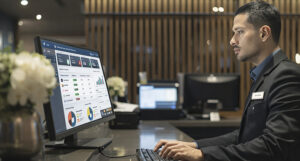The hotel industry market size is projected to reach 12.1 billion U.S. dollars by 2033 with a CAGR of 10.20% between 2023 to 2033. It clearly shows that the hotel industry is constantly growing and evolving due to various factors. However, the evolution of this industry is basically driven by advancements in technology and the ever-changing requirements of guests. In 2024, the hotels that will grow as per the market demand will become part of this growing economy. Incorporation of innovations and advancements like hotel channel management system will position them to enhance their guest experience, streamline operations, and ultimately drive profitability. So, let’s explore 24 latest hotel technology trends to watch for in 2024 in order to stay ahead of the curve.
Enhancing the Guest Experience
- Smart hotel rooms: Technology plays a crucial role in creating a comfortable and personalized guest experience and smart hotel rooms are a great example of it. They are integrated with various technologies that allow guests to adjust the room setting as per their needs. For instance, they can adjust lighting, temperature, and steam, as well as they can watch their favorite show just by using voice command or smartphone.
- Contactless solutions: Technology also contributes to hotels providing contactless solutions to their guests like check-in and check-out processes through mobile apps or sites. Contactless room access through digital keys, and digital payment options like mobile wallet.
- Voice-controlled hub: Voice-controlled hubs are becoming popular amenities in hotel rooms. They help guests control room features, request amenities, access hotel information, and much more. This is all through voice commands.
- Artificial intelligence and machine learning: AI and ML are transforming the hotel industry in various aspects, especially by enabling personalization. AI chatbots can address guest queries related to the hotel 24/7, as well as recommend activities based on guest preference and offer personalized room amenities. ML is utilized by hotels to predict the preferences of their guests and tailor marketing efforts accordingly.
- Immersive technologies: Immersive technologies like virtual reality (VR) and augmented reality (AR) are making their way into the hotel industry. These technologies allow guests to explore nearby locations or attractions or even take a virtual tour of the hotel before check-in. It also provides location-based information.
- Robotics and automation: Robots are used by hotel management to enhance the guest experience, as they can be employees for various kinds of tasks. These tasks involve housekeeping, room service delivery, and even translational activities and services.
- Facial recognition technology: With the implementation of facial recognition technology hoteliers enhance security measures for optimal guest experience. It is used for contactless check-in processes and even re-arrival recognition of guests.
- Occupancy-based sensors: Occupancy-based sensors are one of the specialized components of personalized service. It automatically adjusts the lighting and temperature of the room in the presence of guests. This leads to conservation of energy by reducing the carbon footprints of the hotel. Furthermore, these sensors are used to optimize cleaning schedules.
Optimizing the Hotel Operations
- Hotel channel management system: The Hotel channel management system streamlines the distribution process by facilitating real-time inventory and rate updates across various online booking platforms. Channel management solution eliminate the risk of overbooking by fetching real-time updated data about availability.
- Cloud hotel property management system: These cloud solutions offer numerous benefits over traditional on-premises systems. As it provides great accessibility by validating authorized access over the internet from anywhere. Besides, cloud-based systems often get automated updates that make sure the hotel system remains intact with the latest features and security patches.
- Mobile hotel PMS: The mobile hotel PMS facilitates hotel staff to manage several tasks on the go that increase the efficiency of their work. From guest requests to housekeeping activities, the mobile hotel PMS offers real-time access to all relevant information and streamlines communication within the hotel.
- Revenue management system: RMS utilizes historical data and market trends to optimize pressing strategies. It considers many factors such as seasonal fluctuations, occupancy rates, competitor pricing, etc., and sets prices accordingly which helps to maximize revenue potential.
- Integrated technology solutions: Integrating various hotel-affiliated technologies into a single platform fosters seamless communication and information flow. This can include integrating the PMS with channel management, revenue management, and guest messaging platforms, creating a centralized hub for managing all hotel operations, or you can opt for Aiosell for the complete range of hotel management solutions.
- Sustainability initiatives: Environmental consciousness is becoming increasingly important for guests, and hotels are actively adopting sustainable practices. This is by using energy-efficient appliances, water conservation practices, and eco-friendly amenities.
- Energy-saving appliances: Energy-saving appliances gaining popularity in the hotel industry by using them they can reduce energy consumption. The energy-saving appliances include LED lights, smart thermostats, and water-efficient fixations. These practices not only lead to a sustainable future but also help to reduce costs in the long term.
- Automated waste management: Hotel businesses generate a significant amount of food waste. This is where automated waste management systems help to reduce waste by analyzing consumption patterns and optimizing the food preparation process. Moreover, it facilitates the sorting of recycled materials and contributes to the hotel’s sustainability efforts.
Marketing and Distribution
- Text message marketing: People usually go for text messages over phone calls, hence by incorporating text message marketing hotels can make a huge impact on guests. Most of them seize the opportunity to text rather than make a call to the front desk. It enables hoteliers to build strong relationships through their preferred communication channels. Moreover, text facilitates longer conversations even for a longer time which can result in getting more qualified leads.
- Voice search: Voice search technology is quite popular among consumers, thus through integrating voice-activated features hotels can cater to consumers’ requirements affiliated to this. Guests can search for hotel information and relevant data effortlessly through voice search.
- Booking on a phone: Smartphones become a huge part of everyone’s day-to-day life, people find it easier to do tasks on phones rather than on the desktop. An easy-to-navigate mobile website plays a crucial role in getting more bookings as well as building loyalty among guests.
- Metasearch booking: Google Hotel Ads, Trivago, and TripAdvisor are referred to as meta-search engines that drive more website traffic than any other platform. They collect information on different properties of several hotel’s websites and compare them all in one place. Additionally, marketing on these platforms drives more direct booking than any other platform.
- Options of contactless payments: Contactless payment options, such as mobile wallets are convenient for guests due to their speed and accessibility. Hotels should ensure they offer a variety of contactless payment options to cater to guest preferences and enhance their checkout process with good reviews.
- Social media marketing: Social media platforms are great for marketing because approximately 5.17 billion people use social media around the world. This showcase being actively present on social media can drive lots of leads. It also helps to connect with potential guests by offering discounted services. By running target social media campaigns and fostering online communities hotels can cataract new customers and build brand loyalty.
- Big data analytics: Big data analytics validate hotels to extract valuable insights from vast amounts of guest data. These valuable insights help to identify guest preferences, and trends among them, and even personalize marketing efforts.
- Guest review and feedback platforms: Positive reviews and feedback help to flourish business, especially in the hotel industry as they directly impact the booking rates. They also help hoteliers to understand guest sentiments and identify areas for improvement. Hence, establishing a proper platform for review and feedback is crucial for any hotel.
Concluding Remark
Technology is a crucial aspect in revolutionizing various industries including the hotel industry. With the implementation of the latest trends and technology hotels can gain a competitive edge in the marketplace. Additionally, hotel management system solutions like Aiosell assist hoteliers in facilitating hotel management with a complete range of software solutions like RMS, PMS, hotel channel management systems, etc. to streamline operations and elevate efficiency and profitability.



